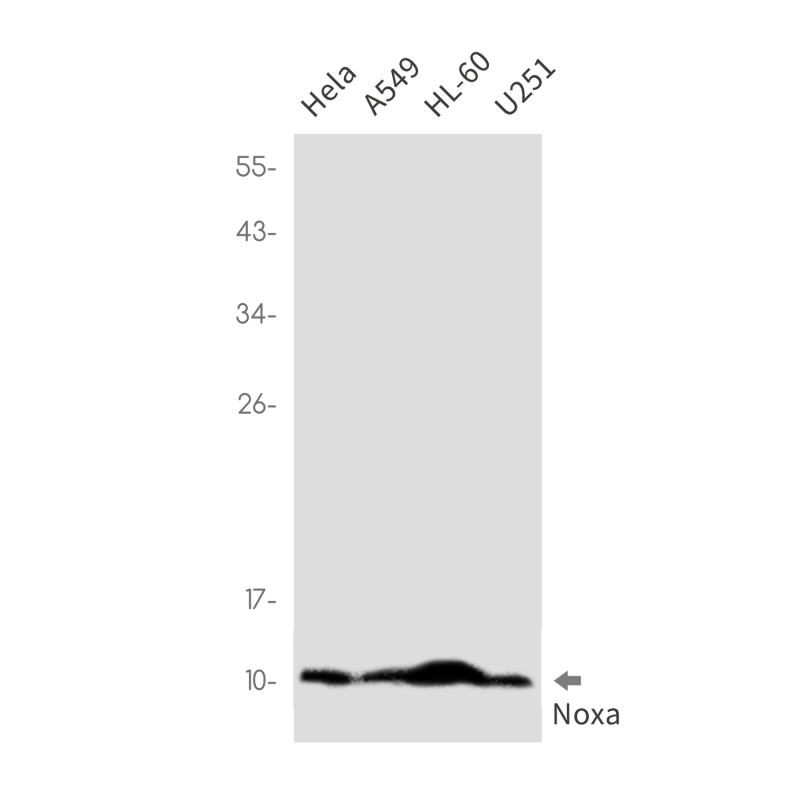
| WB | 1/500-1/1000 | Human,Mouse,Rat |
| IF | 咨询技术 | Human,Mouse,Rat |
| IHC | 咨询技术 | Human,Mouse,Rat |
| ICC | 技术咨询 | Human,Mouse,Rat |
| FCM | 咨询技术 | Human,Mouse,Rat |
| Elisa | 咨询技术 | Human,Mouse,Rat |
| Aliases | APR; ATL-derived; NOXA; Pmaip1; Protein Noxa |
| Entrez GeneID | 5366 |
| WB Predicted band size | Calculated MW: 6 kDa; Observed MW: 10 kDa |
| Host/Isotype | Rabbit IgG |
| Antibody Type | Primary antibody |
| Storage | Store at 4°C short term. Aliquot and store at -20°C long term. Avoid freeze/thaw cycles. |
| Species Reactivity | Human |
| Immunogen | A synthetic peptide of human Noxa |
| Formulation | Purified antibody in TBS with 0.05% sodium azide,0.05%BSA and 50% glycerol. |
+ +
以下是关于NOXA抗体的3篇参考文献,按文献名称、作者和摘要内容概括整理:
---
1. **文献名称**:*NOXA, a dominant player in the apoptotic response to DNA damage*
**作者**:Vogler M, et al.
**摘要**:该研究探讨了NOXA在DNA损伤诱导的细胞凋亡中的作用,利用特异性抗体通过Western blot和免疫组化检测了NOXA在不同癌细胞系中的表达,揭示了其与p53信号通路的关联及其在化疗药物响应中的关键地位。
---
2. **文献名称**:*Selective targeting of anticancer drugs by NOXA-mediated synthetic lethality*
**作者**:Cragg MS, et al.
**摘要**:研究通过NOXA抗体分析发现,某些抗癌药物(如蛋白酶体抑制剂)可特异性诱导肿瘤细胞中NOXA蛋白上调,导致MCL-1降解并触发凋亡,为合成致死策略提供了实验依据。
---
3. **文献名称**:*NOXA-dependent polarization of the mitochondrial network regulates apoptosis*
**作者**:Wensveen FM, et al.
**摘要**:利用NOXA特异性抗体和荧光共聚焦成像技术,揭示了NOXA在调节线粒体动态变化中的功能,证明其通过促进BAX/BAK激活和线粒体碎片化来增强凋亡信号传导。
---
这些文献展示了NOXA抗体在机制研究、药物开发及细胞凋亡信号通路解析中的广泛应用。如需具体引用信息(期刊、年份等),可进一步补充。
NOXA antibody is a tool used to detect NOXA, a pro-apoptotic protein belonging to the Bcl-2 family. Encoded by the PMAIP1 gene, NOXA (Latin for "damage") is induced by cellular stress signals, including DNA damage, hypoxia, or chemotherapy. It promotes apoptosis by binding and neutralizing anti-apoptotic Bcl-2 proteins like MCL-1. thereby activating BAX/BAK and triggering mitochondrial outer membrane permeabilization (MOMP). NOXA's expression is tightly regulated, primarily by p53-dependent and -independent pathways, making it a key mediator of stress-induced cell death.
NOXA antibodies are widely used in cancer research to study apoptosis mechanisms, drug responses, and tumorigenesis. They enable detection of NOXA protein levels via techniques like Western blot, immunohistochemistry, and flow cytometry. Dysregulation of NOXA is implicated in cancer progression and resistance to therapies, as low NOXA expression often correlates with poor prognosis. Researchers also use these antibodies to explore NOXA's role in non-cancer contexts, such as neurodegenerative diseases and immune responses.
Challenges include specificity due to homology among Bcl-2 family members and variable expression across cell types. Nonetheless, NOXA antibodies remain critical for understanding apoptosis regulation and developing targeted therapies that modulate cell death pathways.
×